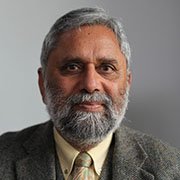Herald Report
 An unprecedented change is taking place in global capitalism regarding the spatial shift from old advanced capitalist economies to emerging capitalist economies. This change is arguably qualitatively and quantitatively different from the usual pattern of uneven regional development under capitalism.
An unprecedented change is taking place in global capitalism regarding the spatial shift from old advanced capitalist economies to emerging capitalist economies. This change is arguably qualitatively and quantitatively different from the usual pattern of uneven regional development under capitalism.
For the first time in the history of global capitalism, the shift is taking place from relatively less populated economies to regions of the world with huge populations amid the massive phenomenon of global climate change.
In the light of the above discussion, a lecture will be delivered by Prof. Dr Pritam Singh, Oxford School of Global and Area Studies, University of Oxford presenting an outline of the transitional path to eco-socialism as part of the Distinguished Speaker at the Sustainable Development Policy Institute (SDPI) at its seminar hall 4th floor Taimoor Chambers, Fazle Haque Road Blue Area on Thursday (April 18) at 3pm. Shafqat Munir, Director, policy, SDPI, will moderate the lecture
Pritam Singh’s profile
Professor Pritam Singh took his DPhil from Oriel College, Oxford where he was awarded the Edward Boyle/Charles Wallace Scholarship. He took his BA Hons School in Economics and MA Hons School in Economics degrees from Punjab University, Chandigarh (India).
He did his MPhil from Jawaharlal Nehru University, Delhi with distinction. Before coming to Oxford, he has taught at University of Delhi as a lecturer in economics and at Punjab University, Chandigarh, as a Reader in Economics.
In 2007, he was elected as a Research Associate at the Department of International Development, Queen Elizabeth House, University of Oxford, and in 2009, he was a visiting professor at Jawaharlal Nehru University, Delhi, in 2013 at Lomonosov Moscow State University, and in 2018 at University of Uberlandia, Brazil.
He has taught at Oxford Brookes University for thirty years and was awarded the distinguished Professor Emeritus status by the University in 2018.
At Oxford Brookes Business School, Prof Pritam led the research cluster on Environmental and Development Economics.
His work is currently focussed on two main areas: the sustainability implications of the spatial shift taking place in global capitalism; and the Indian capitalism with emphasis on decentralisation and human rights and with special reference to Punjab.
His two recent books “Federalism, Nationalism and Development: India and the Punjab Economy and Economy, Culture and Human Rights: Turbulence in Punjab, India and Beyond have received critical acclaim as path breaking works of scholarship.
Both the books are being translated in other languages. His book Federalism, Nationalism and Development: India and the Punjab Economy brings together methodological approaches and field level data to add new dimensions to the understanding of federal modes of governance and the development process, particularly in India.
“The book is one of those rare academic publications which have the potential to make history,” commented the late Professor Ajit Singh of Cambridge University in his review of the book in Economic and Political Weekly.
His Economy, Culture and Human Rights: Turbulence in Punjab, India and Beyond marshals diverse theory and evidence drawn from economics, political science, moral philosophy, and history to make a case for understanding human rights as intrinsically important rather than simply as a means to achieve a given set of economic and political goals.
The book was the subject of over half an hour TV interview with Pritam on Sky/Sikh Channel.
His edited books Punjabi Identity in a Global Context (with S Thandi) and Equal Opportunities in the Curriculum (with M Pearl) were pioneering works in their respective fields.
His research articles and reviews have appeared in various journals including Commonwealth and Comparative Politics, Contemporary South Asia, Economic and Political Weekly, International Journal of Green Economics, International Journal of Punjab Studies, Journal of Development Studies, Journal of Peasant Studies, Strategic Change: Briefings in Entrepreneurial Finance, Third World Quarterly, Journal of Business Ethics. World Review of Political Economy, and Capitalism Nature Socialism. On an invitation from EPW, he edited its Special Punjab Issue in January 2017.
He was given ‘Distinguished Achievement Award’ in Political Economy of the 21st Century by the World Association of Political Economy at its 10th forum in Johannesburg in June 2015.
Pritam’s main areas of teaching interest and expertise are: development economics, environmental economics, comparative economic systems and competing economic paradigms.
He has developed new modules in these fields both at UG and PG levels.
Pritam takes keen interest in pedagogic theory and practice. In particular, he has explored the dimensions of equal opportunities in teaching concerning curriculum, teaching methodologies and assessment of student performance.
He is on the editorial board of the International Journal of Pluralism and Economics Education, and has been on the editorial board of Brookes eJournal of Teaching and Learning, and has co-edited (with M Pearl) a book on pedagogic research (Equal Opportunities in the Curriculum.
He was invited to give the keynote address at an international conference on Teaching Methodologies in India and Abroad at Baba Farid University, Bathinda, Punjab in India in January 2010 where he spoke on ‘Teaching methodologies: some lessons from the comparative experience of teaching in India and the UK’.

The High Asia Herald is a member of High Asia Media Group — a window to High Asia and Central Asia
